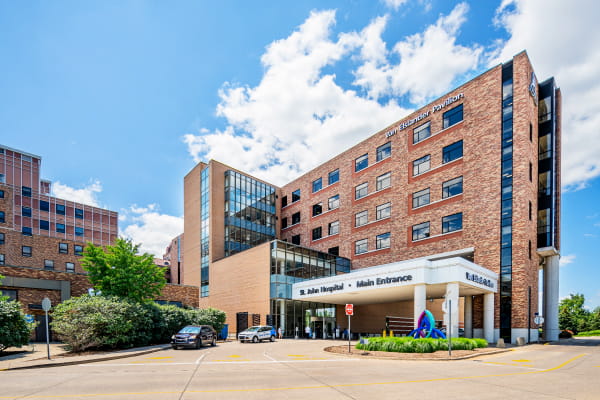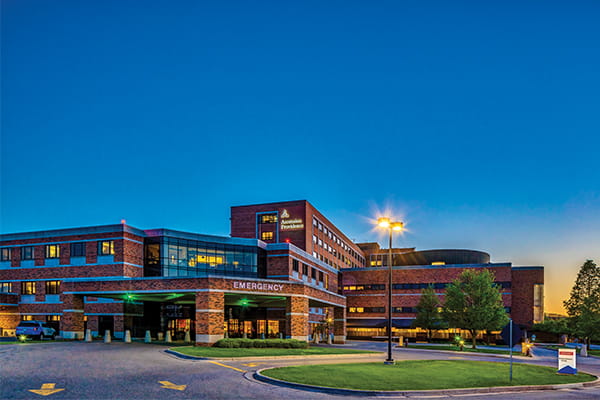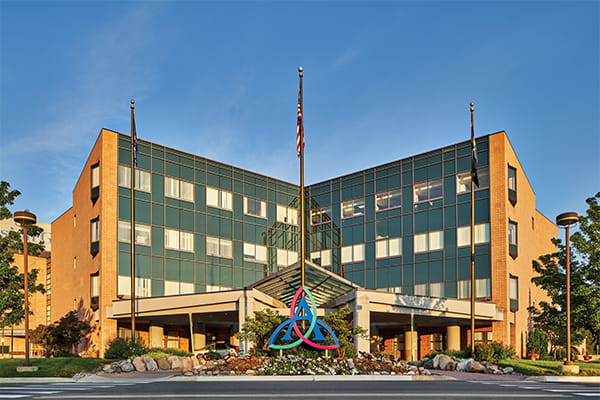
Transplant surgery experience that is decades deep
Michigan Kidney Transplant Specialty Center
The Ascension St. John Kidney Transplant Specialty Center has been internationally recognized for the compassionate, personalized care and services we provide to you and your family and rank among the highest success rates in the country for kidney transplants. Our team understands the difference a transplant can make and will support you and your family every step of the way.
For information on the services offered at the Ascension St. John Kidney Transplant Specialty Center, please call 313-343-3047.
Become a Living Donor
Complete the Living Donor Online Health Questionnaire or request a consult by filling out the Kidney Transplant Referral Form below.
CLINICAL REFERRAL FORM LIVING DONOR QUESTIONNAIRE
Our Kidney Transplant Surgeons
Darla Granger, MD is the Director of the Ascension St. John Kidney Transplant Specialty Center. She is a board-certified in General Surgery, a Fellow of the American College of Surgeons, and a Clinical Associate Professor of Surgery at Wayne State University School of Medicine. From the moment you walk through our doors, Dr. Granger and her team of social workers, dietitians, coordinators, and surgeons are here to serve you. Dr. Granger believes in her staff and is eager to work with you on your journey to help improve your kidneys health.
Emad Kishi, MD delivers advanced surgical care for endocrine disorders and transplants. Dr. Kishi provides personalized care for conditions affecting your glands, including the thyroid, parathyroid, adrenal and glands of the endocrine pancreas.
The Transplant Process
Our mission is to provide a personalized approach for your kidney health. The journey begins with our transplant navigators. In order to better understand your current health status and potential eligibility, orientation sessions are available at four Ascension Kidney Health Outreach Centers and at the Ascension St. John Kidney Transplant Specialty Center in Detroit, Michigan.
- Grand Blanc, Michigan 313-343-7476
- Alpena, Michigan 313-343-7476
- Southfield, Michigan 313-343-3472
- Port Huron, Michigan 313-343-3443
- Ascension St. John Kidney Transplant Specialty Center, Detroit, Michigan 313-343-3047
The orientation program at the Ascension St. John Kidney Transplant Specialty Center is for new referrals to our program, including potential kidney transplant recipients and potential live kidney donors.
How To Start the Kidney Transplant Process
- Contact the Ascension St. John Kidney Transplant Specialty Center, call 313-343-3047. Our transplant navigator will take a brief patient history and register you for an evaluation appointment that lasts most of the day. If any of your friends and family are interested in learning about living donation, invite them to come with you to this appointment or suggest they call the transplant center.
- Attend evaluation day. Meet with members of the transplant team, learn expectations, criteria and requirements for a successful transplant experience.
- Complete medical tests. These tests may include blood work, ultrasound, X-rays, EKG, and other important tests that will help determine if transplant surgery is safe for you. If you live outside of the Detroit areas, we can schedule testing at an Ascension diagnostic center near you.
- Based on eligibility, the patient is placed on the United Network for Organ Sharing (UNOS) waiting list.
- Stay active while on the waiting list. Over time you will need to repeat many of the tests you had during your evaluation to monitor your health and candidacy for transplant.
- Stay in contact with your transplant coordinator. Call your coordinator if anything changes, such as your address, insurance or health situation.
Kidney Failure Treatment Options
When kidney failure occurs, replacement of your kidney function can be accomplished through:
- Peritoneal dialysis (PD) is a needle-free treatment done at home. It involves using the lining of the belly to filter waste from the blood. Fluid exchange treatments are performed daily or nightly for at least eight hours using a surgically placed tube in the abdomen.
- Hemodialysis Treatment uses a surgically created fistula or temporary catheter. This allows a machine to filter your blood and clear toxins from your kidneys. This treatment requires you to visit a dialysis center (or performed at home) several times a week for three to four hours.
- Kidney Transplantation is currently the best long-term treatment for kidney failure. A kidney can be donated from either a deceased or living donor. Several steps are needed: a matching donor, surgery, and lifelong immune suppressing medications to avoid organ rejection. The main advantage of this surgery is the quality of life factor. Most patients return to a much more normal lifestyle post-transplant.
Considerations When Exploring Kidney Transplant Surgery
- Imagine your life on treatment.
- What is most important to you in your life right now?
- Think about people who can support you throughout your transplant journey.
- Talk through your options with family and friends.
- Ask kidney donors and recipients questions about their transplant experience.
- Explore the possibilities of finding a living donor.
Types of Kidney Transplant Surgery
- Living donor kidney transplant: A surgery where doctors put a kidney from a living person into someone whose kidney no longer work.
- Deceased donor kidney transplant: A surgery where doctors put a kidney from someone who has died into someone whose kidneys no longer work.
How long does it take to get a kidney transplant?
- A living donor kidney transplant can happen electively and typically within a year or less of finding a matching donor who is able to donate.
- Nationally, a deceased donor kidney transplant takes on average, three to five years, but the transplant rate varies by state. There are other factors that can affect your wait time. Securing a matching donor and recipient is based on medical condition, where the patient lives, how long the patient has been on dialysis, and the waiting list. Your chances of getting a kidney increases over time.
To view updated information regarding kidney transplants, please visit the Scientific Registry of Transplant Recipients (SRTR) webpage.
Help other’s and donate life! Find out more about organ donation or become an organ donor by registering at the Gift of Life Michigan. Without donors, there are no transplants.
Featured Locations


